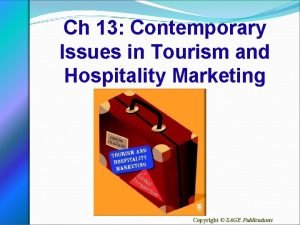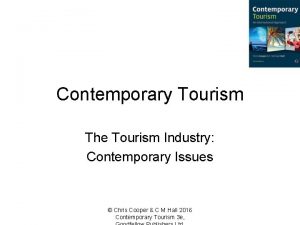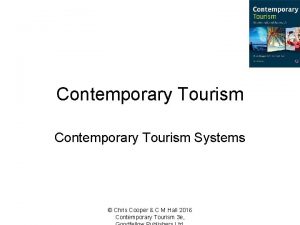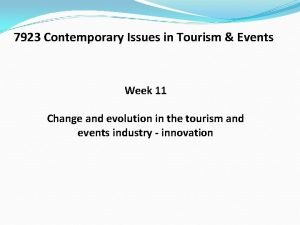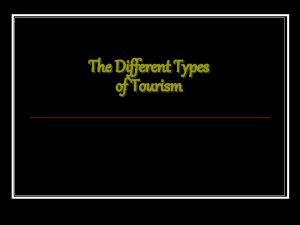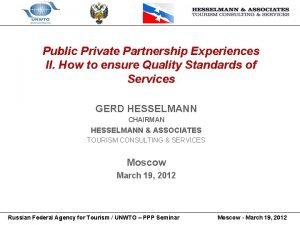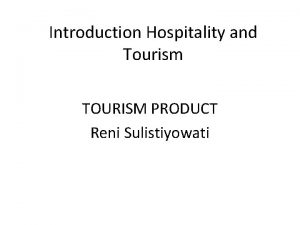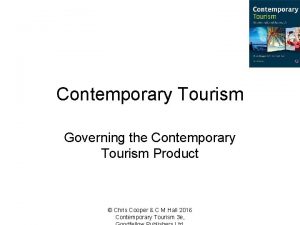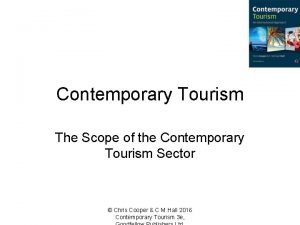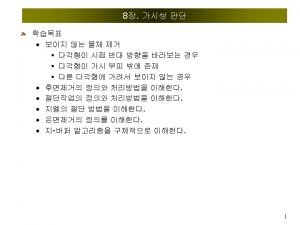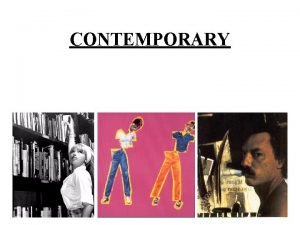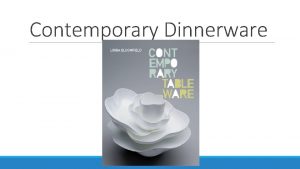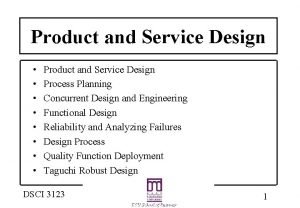Contemporary Tourism Supporting the Contemporary Tourism Product Service











- Slides: 11

Contemporary Tourism Supporting the Contemporary Tourism Product - Service Management © Chris Cooper & C M Hall 2016 Contemporary Tourism 3 e,

Lecture Objectives • Appreciate the relationships between the elements of the destination product and experience • Understand a ‘service management’ perspective • Recognise the difference between ‘product’ and ‘customer’ orientations • Be aware of issues related to tourist satisfaction • Be familiar with the concept of, and challenges with, managing and measuring service quality • Understand the frameworks which link employees, customers and organisational performance • View human resource management as a strategic © Chris Cooper & C M Hall 2016 function Contemporary Tourism 3 e,

Context • How do tourists evaluate tourism experiences? • Dependent on component parts • Evolution towards a ‘service mindset’ • Tourism purchases are mainly services • Services lead to a strategic view • This is the new paradigm for tourism © Chris Cooper & C M Hall 2016 Contemporary Tourism 3 e,

Definition • The central tenet of the service management paradigm was defined by Albrecht (1988): • “a total organizational approach that makes quality of service, as perceived by the customer, the number one driving force for the operations of the business” (p. 20). © Chris Cooper & C M Hall 2016 Contemporary Tourism 3 e,

Customer and Service Orientation • Customer at the centre of decisions • Customer centric focus • Not selling but creating value © Chris Cooper & C M Hall 2016 Contemporary Tourism 3 e,

Service Management Concepts • • • Service encounter Customer contact employees Customer satisfaction More than satisfaction Service quality – SERVQUAL (although approach is strongly criticised it is still widely used) – The Nordic model © Chris Cooper & C M Hall 2016 Contemporary Tourism 3 e,

Tourists, Employees and Business Performance • Service profit chain • Employee-customer linkage research © Chris Cooper & C M Hall 2016 Contemporary Tourism 3 e,

Strategic HRM • HR are the tangible resources of the firm • From personnel management to SHRM • Integrates HR into strategy • Integral to the quality of the service encounter © Chris Cooper & C M Hall 2016 Contemporary Tourism 3 e,

Service Culture & Climate • • All organizations have a culture Manager cannot control all encounters Creation of a service climate Balanced scorecard approach © Chris Cooper & C M Hall 2016 Contemporary Tourism 3 e,

Balanced Scorecard elements 1. How do customers see us? 2. What must we be good at in order to satisfy our customers (internal processes)? 3. How can we continue to improve and grow (learning and training)? 4. How do we look to our owners / shareholders (financial picture)? © Chris Cooper & C M Hall 2016 Contemporary Tourism 3 e,

Recommended Readings • Carú, A. & Cova, B. (2003). Revisiting consumption experience: a more humble but complete view of the concept. Marketing Theory 3(2), 267 -286. • Heinonen, K. , Strandvik, T. , Mickelsson, K-J. , Edvardsson, B. , Sundström, B. & Andersson, P. (2010). A customer-dominant logic of service. Journal of Service Management 21(4), 531 -548. • Helkkula, A. (2011). Characterising the concept of service experience. Journal of Service Management 22(3), 367 -389. © Chris Cooper & C M Hall 2016 Contemporary Tourism 3 e,
 Contemporary issues in tourism and hospitality
Contemporary issues in tourism and hospitality Contemporary tourism meaning
Contemporary tourism meaning Contemporary tourism issues
Contemporary tourism issues Contemporary tourism
Contemporary tourism Contemporary tourism definition
Contemporary tourism definition Contemporary issues in tourism
Contemporary issues in tourism Contoh supporting service
Contoh supporting service Nature of services
Nature of services Mass tourism vs alternative tourism
Mass tourism vs alternative tourism Tourism product development
Tourism product development Components of tourism product
Components of tourism product Symbiotic tourism products of india
Symbiotic tourism products of india
